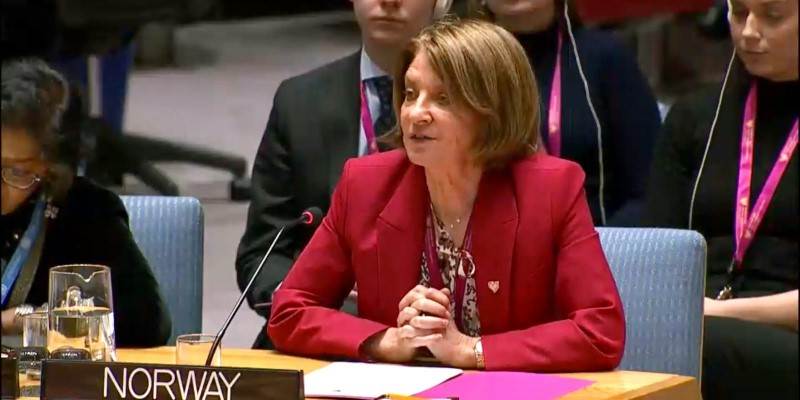Check against delivery
President,
Thank you for convening this important meeting. We welcome the crucial input from the briefers, including the High Commissioner for Human Rights.
I have the honour to speak on behalf of the Nordic countries, Denmark, Finland, Iceland, Sweden and my own country, Norway.
Transitional Justice exposes the human dimensions of a conflict by putting the rights of victims first. In societies emerging from conflict, inclusive and effective responses are an investment in peace, stability, justice and democracy.
Transitional justice consists of a broad set of measures: from ensuring accountability for international crimes, honoring the victim’s right to truth, acknowledging their suffering, to providing reparations for damage done. Effective and inclusive institutions on all levels have a vital role. The whole of society must come to terms with the past and work towards reconciliation.
Yet, this is not easy. Transitional justice measures are set up in complex and sensitive political circumstances. We have experienced in peace negotiations, that one of the most difficult questions is impunity. Those with the most power to end conflicts are often the least likely to submit to justice for their crimes.
President,
As we heard this morning, the Colombian Peace agreement showed that the goals of peace and justice for victims could be mutually reinforcing. Today three years into implementation – the Truth Commission, the Special Jurisdiction for Peace, and the Commission of Missing Persons are fully operational. Support from the Security Council played a crucial role. While not without challenges and controversies, Colombia’s experience with transitional justice, while important in its own right, also provides us with important lessons for other peace processes.
President,
Civil society, in particular women, should be included right from designing through implementation of transitional justice mechanisms. Women must be seen as peacebuilders rather than victims. By integrating a gender equality perspective, conditions are improved for inclusive and democratic societies, where human rights are respected. One Nordic example is Specialized Police Teams to the UN Mission in South Sudan. They support the national police to prevent, investigate and prosecute sexual and gender-based violence.
Let me mention four measures that the UN can take to strengthen our work:
Firstly, the mandates of UN Peace Operations should include support to nationally owned transitional justice initiatives. Here we can draw lessons from MINUSMA and MONUSCO.
Secondly, United Nations Envoys and Special Representatives should be encouraged to promote transitional justice initiatives, and inclusion in all levels of a peace process.
Thirdly, this Council must strengthen its partnerships with regional organizations, including the African Union. Which last year adopted a ‘Transitional Justice Policy’ for supporting reconciliation.
Finally, the advisory role to the Council of the Peace Building Commission could be better utilized. There are valuable lessons learned from countries that have gone through transitional justice processes.
President,
When done right, transitional justice is transformative. Providing local institutions with legitimacy for the challenging path towards lasting peace. When war-torn societies take decisive steps towards peace, we, the international community should support these efforts in every way possible.
The victims of conflict deserve nothing less.
